Volume 28 - Supplementary
IBJ 2024, 28 - Supplementary: 228-228 |
Back to browse issues page
Download citation:
BibTeX | RIS | EndNote | Medlars | ProCite | Reference Manager | RefWorks
Send citation to:



BibTeX | RIS | EndNote | Medlars | ProCite | Reference Manager | RefWorks
Send citation to:
Falah Heydari Nezhad1 M, Pourghane P. Telemedicine as a Catalyst for Enhanced Geriatric Care and Caregiver Support: A Systematic Review. IBJ 2024; 28 :228-228
URL: http://ibj.pasteur.ac.ir/article-1-4651-en.html
URL: http://ibj.pasteur.ac.ir/article-1-4651-en.html
Abstract:
Introduction: Telemedicine addresses the challenges of an aging population and caregiver burden. With the rise in older adults, traditional healthcare systems struggle to provide adequate care, causing significant stress for caregivers. Telemedicine can improve access to and quality of elderly care while alleviating caregiver strain. This review evaluated the role of telemedicine in reducing caregiver burden and enhancing geriatric care, highlighting its importance in modern healthcare.
Search Strategy: Following the Preferred Reporting Items for Systematic Reviews and Meta-Analyses (PRISMA) guidelines, a structured literature search was conducted across PubMed, Scopus, Web of Science, and Embase. The search targeted studies published between 2015 and 2023, focusing on telemedicine, caregiver burden, and elderly care. Inclusion criteria encompassed articles directly examining the impact of telemedicine on reducing caregiver burden and improving elderly care quality. Studies outside these criteria or the specified publication range were excluded. Ten were included from the 30 articles identified, providing a focused analysis of the role of telemedicine in geriatric care and caregiver support.
Results: A review of the 10 selected articles indicated that telemedicine interventions reduced caregiver burden and enhanced the quality of care for the elderly. Consistent findings showed improved caregiver mental health, reduced physical, and emotional stress, and increased satisfaction with care processes. For elderly patients, telemedicine improved access to healthcare services, better management of chronic conditions, and enhanced patient engagement and autonomy. These outcomes underscore the potential of telemedicine as a crucial tool in geriatric care, offering viable solutions to the challenges of an aging population and caregiver demands.
Conclusion and Discussion: This systematic review highlights the substantial benefits of telemedicine in addressing the dual challenges of caregiver burden and elderly care. A detailed analysis of recent studies reveals that telemedicine alleviates pressure on caregivers and significantly improves the accessibility and quality of healthcare services for the elderly. The findings advocate for integrating telemedicine into standard geriatric care practices, suggesting a promising avenue for enhancing the well-being of both caregivers and elderly patients. As the global population ages, adopting telemedicine could be pivotal in developing more sustainable, effective, and compassionate healthcare systems.

Search Strategy: Following the Preferred Reporting Items for Systematic Reviews and Meta-Analyses (PRISMA) guidelines, a structured literature search was conducted across PubMed, Scopus, Web of Science, and Embase. The search targeted studies published between 2015 and 2023, focusing on telemedicine, caregiver burden, and elderly care. Inclusion criteria encompassed articles directly examining the impact of telemedicine on reducing caregiver burden and improving elderly care quality. Studies outside these criteria or the specified publication range were excluded. Ten were included from the 30 articles identified, providing a focused analysis of the role of telemedicine in geriatric care and caregiver support.
Results: A review of the 10 selected articles indicated that telemedicine interventions reduced caregiver burden and enhanced the quality of care for the elderly. Consistent findings showed improved caregiver mental health, reduced physical, and emotional stress, and increased satisfaction with care processes. For elderly patients, telemedicine improved access to healthcare services, better management of chronic conditions, and enhanced patient engagement and autonomy. These outcomes underscore the potential of telemedicine as a crucial tool in geriatric care, offering viable solutions to the challenges of an aging population and caregiver demands.
Conclusion and Discussion: This systematic review highlights the substantial benefits of telemedicine in addressing the dual challenges of caregiver burden and elderly care. A detailed analysis of recent studies reveals that telemedicine alleviates pressure on caregivers and significantly improves the accessibility and quality of healthcare services for the elderly. The findings advocate for integrating telemedicine into standard geriatric care practices, suggesting a promising avenue for enhancing the well-being of both caregivers and elderly patients. As the global population ages, adopting telemedicine could be pivotal in developing more sustainable, effective, and compassionate healthcare systems.

| Rights and permissions | |
 |
This work is licensed under a Creative Commons Attribution-NonCommercial 4.0 International License. |







.png)
